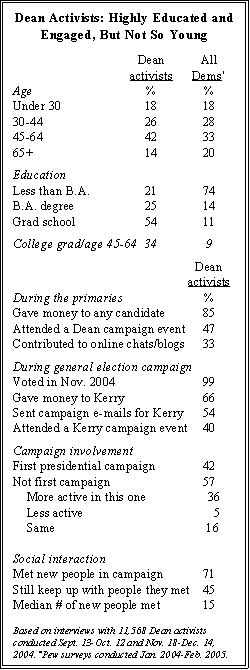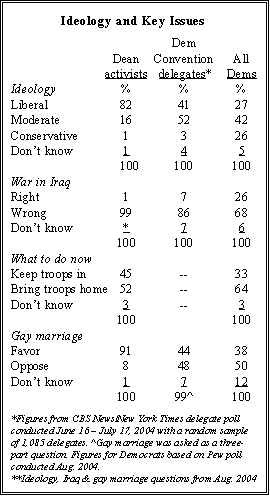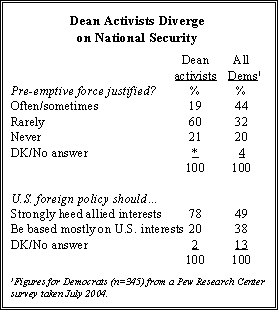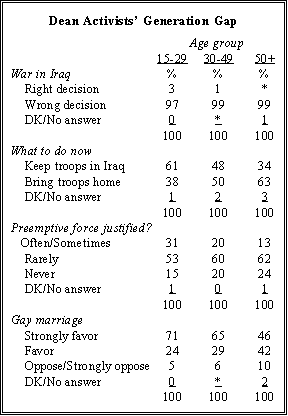Introduction

Although former Vermont governor Howard Dean failed to win the Democratic presidential nomination, his campaign left a strong imprint on the political world. It assembled a network of over a half-million active supporters and contributors, raised over $20 million in mostly small donations online, and demonstrated the power of the internet as a networking and mobilizing tool in politics.
Who are the internet activists the people widely known as “Deaniacs” who joined the Dean campaign as it slowly grew from asterisk status in early 2003 polls to the frontrunner position at the beginning of 2004? A new Pew survey provides the first detailed look at the cyber-soldiers of this pioneering campaign. An internet survey with a random sample of 11,568 activists drawn from the online database of those who had contributed money or otherwise worked on behalf of Gov. Dean provides insight into who they are, why they joined, how they reacted to Dean’s loss and President Bush’s reelection, and what they think about the future of the Democratic Party.1
The survey was conducted in two waves: one before the election (Sept. 13-Oct. 12), and a second after the election (Nov.18-Dec. 14).
As expected, a key rallying point for Dean activists was their shared opposition to the war in Iraq. Two-thirds cited the war as the most important factor in their decision to join the campaign. The perceptions that Dean was willing to speak unpopular truths and would change the direction of country were also strong unifying factors. However, the study’s findings belie the popular image of Dean activists as largely young and drawn from college campuses. Instead, the group’s overall age distribution is fairly close to that of Democrats in the general public.
But Dean activists are far wealthier, better educated, more secular and much less ethnically diverse than other Democrats. A disproportionate number of Dean activists are white, well-educated Baby Boomers fully a third are college graduates between the ages of 45 and 64, compared with just 9% of Democrats in the general public. But the image of younger Deaniacs as political newcomers has been borne out. For more than four-in-ten (42%) Dean activists and two-thirds of those under age 30 the Dean campaign represented their first foray into active presidential politics. And among those who were political veterans, a sizable number (36%) said they were more engaged this time than in previous campaigns.

The survey also finds that Dean’s supporters were not discouraged by his campaign’s demise or Kerry’s general election loss, but instead constitute an engaged group of citizens who intend to remain active in the Democratic Party and exert significant influence over its future direction. After Dean dropped out of the race, most worked hard on behalf of Kerry (66% donated money to Kerry) and virtually all of them (97%) voted for him. Half (51%) say that Bush’s reelection motivates them to be even more politically active in the future.
In many respects, Dean activists resemble other political activists on the left and right. They are more interested and engaged in politics, more ideological, and better educated than the average citizen or their fellow partisans. But they are distinctive in one key respect: As befits a campaign that largely established its identity on the internet, the Dean activists are highly internet-savvy; more than three-quarters (77%) said they go online several times per day and 83% have been using the internet for more than five years.2
Compared with Democrats in the general public, the Dean activists are much more liberal across a range of issues, more dissatisfied with President Bush and with the direction of the country. Their liberalism stands out even when compared with delegates to the 2004 Democratic convention, who themselves were significantly more liberal than rank-and-file Democrats. Roughly eight-in-ten Dean activists (82%) describe themselves as liberal, compared with 41% of the convention delegates and 27% of national Democrats.

The activists are critical of the Democratic Party in a number of respects. Most do not think the party has done well in standing up for its traditional constituencies or for liberal positions. Two-thirds (67%) want the party to change to better reflect liberal and progressive values. By contrast, a majority of members of the Democratic National Committee (52%) said in a CNN/USA Today/Gallup survey in February 2005 that they want the party to move in a moderate direction.
Most activists say a new third party would be a good thing, but voice little enthusiasm for actually abandoning the Democratic Party. The activists are divided about how progressive and liberal causes can best be advanced: 38% think the Democratic Party is best able to do this, but an equal number say privately funded advocacy groups are best (36%). Just 13% think a new political party is preferable. And most believe George Soros and other wealthy liberal philanthropists helped the party and progressive causes in general.
Dean activists were motivated by an intense disapproval of President Bush’s job performance (96% strongly disapproved) and by strong opinions on the issues, especially the war in Iraq. They also support gay marriage by more than ten-to-one (91%-8%); half of national Democrats (50%) oppose gay marriage. The activists were attracted to Howard Dean in large part because they believed that he would stand up to Bush and give voice to views widely considered unpopular. Many also believed that he was the best candidate to bring about change inside the Democratic Party.

The war in Iraq was not the only important issue in the activists’ decision to support Dean. One third (34%) said health care was important, and about one-fourth (24%) cited fiscal responsibility; both were issues Dean had championed as governor of Vermont.
Although nearly all Dean activists believe that the decision to invade Iraq was wrong, they are divided on the question of what to do now. Compared with national Democrats, the Dean supporters are actually more supportive of keeping troops in Iraq until the situation has stabilized (44% said this, compared with 33% of Democrats in August 2004).
On other questions related to national security, there are far fewer hawks among the Dean activists than among Democrats nationally. Only about one-in-five Dean activists (19%) say military force is often or sometimes justified against countries that may seriously threaten the U.S. but have not yet attacked, compared with 44% of all Democrats. Just 21% of the activists (and 20% of Democrats nationally) would entirely rule out such preemptive military action.
In addition, the activists are much more supportive of giving strong consideration to the interests of U.S. allies than are Democrats generally. More than three-quarters of Dean activists (78%) say U.S. foreign policy should strongly take into account allied interests. A plurality of Democrats (49%) agree, with 38% backing a policy based mostly on U.S. national interests.

While the Dean campaign drew an amalgam of 1960s liberals and 21st century progressives, there are intriguing generational differences on the war and social issues. Those under age 30 tend to be much more supportive of gay rights, with 71% strongly favoring legalizing gay marriage (compared with 46% among those 50 and older). They also are much more apt to mention gay and lesbian issues as a key reason they joined the campaign (21% vs. 4%).
On military matters, the older activists who came of age in the 1960s are significantly less supportive of keeping troops in Iraq (34%, vs. 61% among the younger group), and less likely to say that the use of pre- emptive military force is sometimes justifiable (13% vs. 31%).
Other Findings
Dean activists are heavy news consumers and rely on a wide array of sources the web, newspapers, radio and, to a lesser extent, TV. Nearly as many say they regularly get news from the network and cable news websites as from the news broadcasts themselves. And 58% say they regularly listen to NPR, compared with just 16% of the general public.
The Dean campaign formed the basis for an extensive and enduring social network. Fully 71% of the activists say they met someone in person or online through the campaign, and 45% still keep in touch with a campaign contact. But most activists say they were drawn to the campaign because of politics and the issues, and not mainly by the prospect of forming relationships with people who shared their values.
The activists remain committed to the Democratic Party, even if some are reluctant supporters. They are clearly dissatisfied with party leaders: 80% of the activists say Democratic leaders supported the war in Iraq because they were afraid to stand up to the president.
Nine-in-ten Dean activists blame Dean’s loss in the primaries on “negative news coverage.” Many also pointed to perceptions that Dean was not electable (73%). While a third blamed Dean’s campaign performance, just 19% pointed to Dean’s policy stances as a reason he lost.
The activists overwhelmingly think of themselves as progressives (90%) and most describe themselves as patriots (80%). More than half (55%) call themselves fiscal conservatives.
Guide to the Report
The first section of this report, which begins on p. 7, covers the attitudes of Dean activists toward the Democratic Party and the future of progressive politics. Section II, which starts on p. 12, covers the activists’ feelings about the Dean campaign. Section III, which provides a detailed look at the activists’ internet activities and news consumption, begins on p. 20. And Section IV (p. 26) looks more closely at the activists’ political values and attitudes. A description of the study’s methodology begins on p. 31.